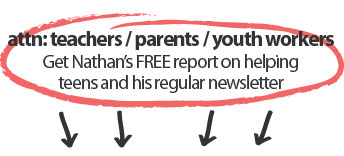Self management, the key to student engagement
 50% of Emotional Intelligence comes down to Self Awareness and Self Management!
50% of Emotional Intelligence comes down to Self Awareness and Self Management!
In Social + Emotional Intelligence:
- Self-Awareness is your ability to accurately perceive your emotions and stay aware of them as they happen.
- Self-Management is your ability to use awareness of your emotions to stay flexible and positively direct your behaviour.
In my work running PDs for teachers and professionals in the area of Social + Emotional Intelligence, often the biggest positive shifts come when the adults stop focussing on trying to control the behaviour of other people and simply start to focus on being more aware of their own emotions, actions and language and managing that.
The ability to manage yourself plays a huge role in your success as a teacher, youth worker or parent.
Competence and skills can be totally let down by a lack of self awareness and self management. It results in highly skilled adults making a complete mess due to an inability to manage their emotions, language and behaviour when trying to engage young people (and other adult staff for that matter).
Let me ask you this question – in the context of the classroom and students you work with, the young people you’re wanting to engage in learning or personal development – how many young people can you control?
The truth is NONE!
Not one!
The only person you can truly CONTROL is YOU!
We can spend so much of our energy trying to control or even manage behaviour and engagement in focussing on making the young people we work with act in a certain way, or engage in a particular activity, when one of the biggest elements of engagement comes back to – when you manage yourself then you can create an environment for engagement, motivation and participation.
On a side note ENGAGEMENT is not about control anyway…
So what does it mean to MANAGE YOU in the context of ENGAGING young people?
One of the 6 Core Needs Of Teens – as I outlined in my report titled “Understanding Teenagers” is CERTAINTY.
Young people need to feel CERTAIN about you, they need to feel SAFE and SECURE to open themselves up to engage in your classroom. One of the scariest things for a young person to do, is to put themselves out their with the potential to be ridiculed by their peers, simply engaging in your class or program.
To engage a young person you have to give them a sense of CERTAINTY, SAFETY and SECURITY that they can engage with you and you have their best interests at heart – you will never make them feel stupid, you will never ridicule them.
By managing yourself – managing your emotions – managing your language and your actions you can create an environment which is SAFE and CALM and the young person has a sense of CERTAINTY about what they are walking into, how they will be treated, which version of you they will get if they make a mistake or they’re having an off day (we all have them).
MANAGING YOU also allows you to show the young people that you work with that they are a ‘piece of cake’ no matter what they throw at you – if you allow your emotions to dictate the way you react to negative behaviour, you’re giving young people exactly what they’re looking for – a power struggle, or a badge of honour that says “I got Mr Jones off his game!”
MANAGING YOU also shows the young people you work with that when they are facing a challenge in their life, that you can handle it, they can trust you to stick by them and you do have their back, further reinforcing a sense of CERTAINTY. The truth is a lot of young people we work with dont have a whole lot of CERTAINTY when they go home – they dont know which version of their parents they’ll be met by, or which boyfriend will be there etc.
So essential for engaging young people in a classroom or youth work environment is the concept of self management!
- Create CALM, CERTAINTY and SAFETY
- Show the young person that their BEHAVIOUR is not a challenge to you
- Show the young person that you CAN HANDLE the tough stuff and you have their back
- Model resilience, adaptability, confidence and self-discipline
- Express your emotions appropriately and display Emotional Intelligence
Let us know if there are any ways I can serve and support you, the teens you work with or the adults in your organisation.
Check out the remaining articles relating to “How to motivate and engage teenagers”:
- The silver bullet for student engagement
- The power of empathy in student engagement
- Emotional Intelligence in student engagement
- How to use rewards to motivate students
- How to increase student engagement
- How to effectively communicate with teens
I am regularly running professional development workshops for teachers, youth workers and professionals around based on the principals of developmental psychology, positive psychology and neuroscience to help adults understand teenagers and how best to engage, inspire and empower them to know themselves, be their best and make a positive difference in the world.
I’d love to talk to you about how I might be able to support your organisation and empower you to connect with, engage and motivate the young people you work with – for booking enquiries click here!


1 Comment. Leave new
Hi Nathan,
This is spot on. As a teacher self-reflection and emotional self-management has changed my relationships and classroom dynamics completely. Love what you do. Look forward to seeing more.
Kind Regards,
Jaclyn Cunningham